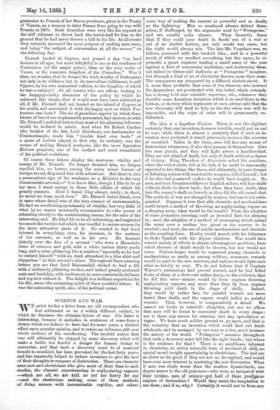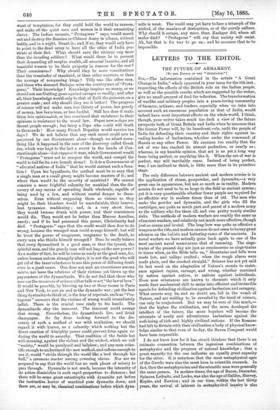fiCIENCE AND WAR.
.print to-clay a letter from an old correspondent, who
VN last .addressed us on a widely different subject, in which he discusses the ultimate future of war. His letter is interesting, because it -embodies in sentences of some force a dream which eve believe to have had for some years a distinct :effect upon popular opinion, and to retaivaninfluence still over whole sections of the unreflecting. The -tavofold notion that war will ultimately :be stopped by some discovery which will .make a battle too fearful a danger for humen beings to encounter, and that such a discovery must be of unmixed -benefit to mankind, has been prevalent for the last forty years, and has repeatedly helped to induce inventors to give the best .of their thoughts.to weapons of destruction. There are chemists .teven now and.electricians who give most ,of their time to such studies, the :chemist experimenting in asphyxiating vapours —which are . all, we are told, .119 yet too heavy . for use —and 'the electricians seeking, some of -them methods of firing cannon with inconceivable rapidity, and others some way of making the current as powerful and as deadly as the lightning. Men so employed -always defend them: aelves,.if challenged, by the argument :used by.i' Protagerae,' and are usually quite sincere. They 'honestly fancy that if they cotild pour -death in floods out or a vial or out of an electric battery, not ottly would war cease, but the right would always win. The late'Mr.T.Jrquhart was, we believe, possessed with this -twofold idea ; arid in a -powerful .novel, of which we recollect everything but the name,he represents a great engineer :leading a small -army of the poor against a host of conquering capitalists, and destroying 'them, not indeed in silence and darkness as " Protagoras " imagines, but through a kind of jet of electricity-thrown upon-their arms. The conquerors are conqueredhy a diffused electrie-ehook. It
is more than probable that some Of the instruct the dynamiters are-penetrated with this belief,-which certainly has a strong hold over scientific -reporters, who, whenever they describe some American invention which is-to sendlleets-toihe bottom, or destroy whole regiments at once, always add that•the new discovery will tend to help cer the slay-when 'war will 'be impossible, and the reign of order -will be permanently undisturbed.
The Idea is a hopeless illusion. There is not the slightest certainty that any invention, however terrible, would put an end to war; while there is almost a certainty that if such an invention were perfected, it would grievously increase the miseries of mankind. Taken in the lump, men will face any means of destruction whatsoever, if also they possess it themselves. Give two men pistols, and they will fight across a handkerchief. They are not afraid of death, but only of death without a chance of victory. King Theodore Of Abyssinia asked his courtiers, when the rocket-sticks fell at his feet, if he could be reasonably expected to face things like those, and ultimately, in pure despair of defeating science with unscientific weapons, killed himself; but if he also had posaessed rockets he would have fought on. No men, not even Prussian soldiers or English -sailors, will face shells without shells to throw back ; but when they have shells, they face the enemy's shells as bravely as they did the old round shot. The methods of war are changed by science, but war is not extinguished. Suppose it true that able chemists and mechanicians could invent a. method of throwing an asphyxiatieg vapour on a sleeping army, what would be the result? First, the adoption of some protective covering, such as ironclad huts for sleeping in ; next, the adoption of a method of encamping which spread the army over a surface too great or too uneven to .be reached ; and next, the use of similar mechanicians and chemists as the assailing force. Huxley would march with his fishermen to choke Tyndall with his Alpine climbers. War would then consist mainly of efforts to obtain advantageous positions, from which showers of death .would be thrown,-but war would not cease. Forlorn-hopes would be organised among chemists or mechanicians as easily as among soldiers, enormous rewards would be paid to the new warriors, and nations would fight each other as briskly as ever. We do not believe that if Captain :Warner's pretensions had proved correct, and he had killed flocks of sheep at a blow—we rather fancy, on the evidence, that he did this once—armies would fly from engines throwing asphyxiating vapours any more than they fly from engines throwing solid death in the shape of shells. Indeed, they would fly rather less, for painful wounds are more feared than death, and the vapour would inflict no painful wounds. That, however, is comparatively a detail. We cannot set limits to scientific slaughter, nor can we affirm that men will be found to encounter death in every shape ; nor is there any reason for entering into any speculation so vague. We-have much solider ground to go anon, and that is the certainty that an invention which could .deal out death wholesale, and be managed by one man or. a few, must increase the misery of the world. " Protagoras " assumes throtighout that such a discovery must fall into the right hands ; but-where is the evidence for that ? There is no saintliness inherent in chemistry, no mercy naturally born of mechanical skill,,no special moral insight appertaining to electricians. "The bad are as clever as the good, if .they are not as far-sighted, and would have even more interest in mastering the new discoveries. What if men one shade worse than the modern dynamitards, one degree nearer to the old-poisoners—who were, as compared with their victims, men of soience —got . hold of these prodigious engines of destruction ? Would they resist the .temptation to use them ; and if se, why.? Certainly, it would not be from any want of temptation, for they could hold the world to ransom, and make all the quiet men and women in it their unresisting slaves. The Indian savants, " Protagoras " says, would march out and destroy the Russian or Chinese Army in silence, without battle, and in a night. Grant it; and if so, they would only have to point to the dead army to have all the cities of India prostrate at their feet. What should save the citizens any more than the invading soldiers? What would there be to prevent their demanding all surplus wealth, all unusual luxuries, and all beautiful women to be their property in ransom for the rest ? Their consciences? Why should they be more conscientious than the remainder of mankind, or than other warriors, or than the average of conquering kings ? Tilly was like other men, and those who stormed Badajoz were the countrymen of " Protagores." Their knowledge ? Knowledge inspires no mercy, or we should not use Gatling guns against savages so readily; and after all, their knowledge would only be that of Exili the poisoner, on a greater scale ; and why should they use it better? The progress of science will not make men less thirsty of power, less greedy of money, less luxurious, or less lustful. Still less does it make them less opinionated, or less convinced that resistance to their opinions is resistance to the moral law. Popes now-a-days are decent people enough ; but fancy a Pope who could will death to thousands ! How many French Deputies would survive ten days ? We do not believe that any such secret could now be possessed by one Government alone—though we admit something like it happened in the ease of the discovery called Greek fire, which was kept to the last a secret in the hands of Constantinople alone—but suppose it were, which Government would " Protagoras " trust not to conquer the world, and compel the world to toil for its own benefit alone? Is it to a Government of "educated natives of India" that he would entrust such a function P Upon his hypothesis, the method must be so easy that a single man or a small group might become masters of it; and where then would be the security of mankind ? We cannot conceive a more frightful calamity for mankind than the discovery of any means of spreading death wholesale, capable of being used by a few, and without mortal danger to themselves. Even without supposing them as vicious as they might be, their blunders would be unendurable, their benevolent tyrannies maddening ; and, in a very short time, they would become drank with power, and their consciences would die. They would not be better than Marcus Aurelius, surely; and if he had possessed this power, Christianity had died. " Protagoras " says that the world would then fear to do wrong, because the wronged man could avenge himself; but will he trust the power of vengeance, vengeance to the death, to every man who thinks himself wronged ? Does he really believe that every dynamitard is a good man, or that the tyrant, the spiteful man, and the greedy man will not leap at the new power? As a matter of fact, he will be twice as ready as the good man, for, unless human nature strangely alters, it is not the good who will get rid of the inner reluctance to use this power of diffusing death even in a good cause. One does not seek an executioner among saints, nor have the relatives of their victims yet blown up the paymasters of the dynamitards. We do not find that those who now use the resources of science either talk or act "the law of love." It would be possible, by blowing up two or three rooms in Paris and New York, to put an end to the dynamite war ; yet the last thing dynamitards think of, is the fear of reprisals, such as " Protagoras " assumes that the victims of wrong would immediately inflict. There is the crucial case ready to his hands. The dynamitards slay the innocent. The innocent could avenge that wrong. Nevertheless, the dynamitards live, and drink champagne. So far from looking forward to the discovery of such a method of war with exultation, we should regard it with horror, as a calamity which nothing but the direct exertion of Almighty power could prevent from again reducing the world to anarchy. That coalition of the feeble but well-meaning, against the violent and the wicked, which we call "society," would be paralysed and helpless ; and any man scientific enough to understand the new method, and callous enough to use it, would "stride through the world like a lord through his hall," a ravenous master among cowering slaves. Nor are we prepared to say that the world has no such phase of misery to pass through. Dynamite is not much, because the intensity of its action diminishes in such rapid proportion to distance ; but there will be some great catastrophe with dynamite yet before the instinctive horror of mankind puts dynamite down, and there are, or may be, chemical oombinations before which dyne
mite is weak. The world may yet have to face a triumph of the wicked, of the maniacs of destruction, or of the purely callous. Why should it escape, any more than Kasbgar did, where all males died? " Protagoras " will say that society will resist. Ah, but that is for war to go on ; and he assumes that to be impossible.



































 Previous page
Previous page